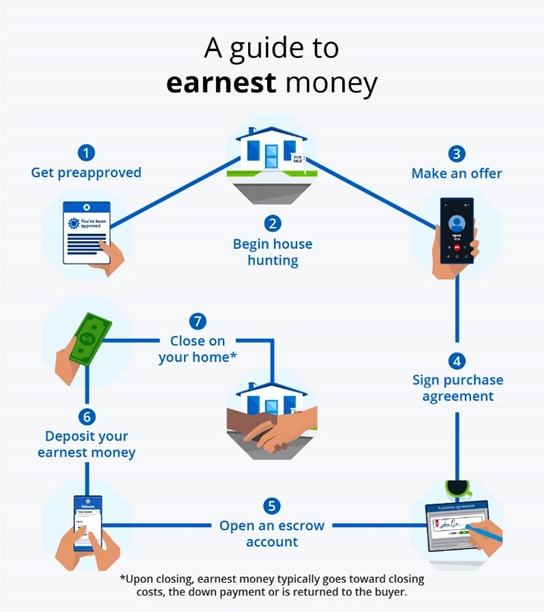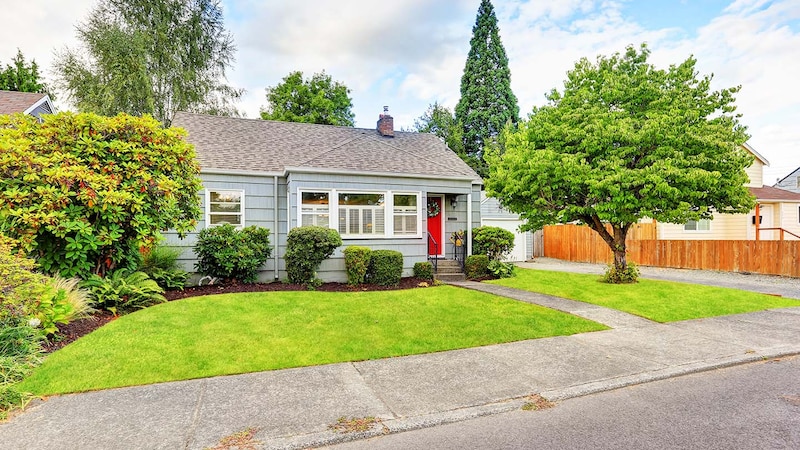What is earnest money, and how much should you pay?

When you find a home and enter into a purchase contract, the seller may withdraw the house from the market. In many cases, sellers will ask for earnest money, also known as a good faith deposit. This deposit shows the seller you’re serious about buying the home, which can be reassuring if they agree to take the house off the market while awaiting the appraisal and inspection results. Earnest money may also help give you some edge if you’re buying a property that’s in high demand.
Let’s take a closer look at how earnest money works and how a good faith deposit might help your homebuying journey.
What is earnest money?
Earnest money, or a good faith deposit, is a sum of money you put down to demonstrate your seriousness about buying a home. In most cases, earnest money acts as a deposit on the property you're looking to buy. You deliver the amount when signing the purchase agreement or the sales contract. It can also be part of the offer. The seller and buyer sign a contract that defines the conditions of refunding earnest money.
The amount of earnest money can vary depending on the location and price of the property, but it typically amounts to a percentage of the property price or a fixed amount suggested by the seller. The purpose of earnest money is to provide assurance to the seller that you are committed to buying the property and to compensate them if you back out of the deal without a valid reason. If the sale goes through, the earnest money is applied toward your down payment or closing costs. However, if the sale falls through due to contingencies outlined in the contract, such as a failed inspection or inability to secure financing, the earnest money is typically refunded to the buyer.
Is earnest money required?
While earnest money is not a requirement, it’s become common in real estate transactions. Because providing earnest money is typical, it may make another buyer’s offer seem more attractive, or at least more serious, to the seller. In some cases, a seller may choose to waive the request for earnest money if they receive multiple offers or if they are highly motivated to sell the property quickly. However, this is not the standard and buyers may want to provide earnest money to remain competitive.
Does earnest money go toward the down payment or closing costs?
Parties in a home sale can agree to apply earnest money to the buyer's down payment or closing costs. In this instance, you're putting up some amount for the home in advance.
How to pay earnest money
Typically, you pay earnest money to an escrow account or trust under a third party, like a legal firm, real estate broker or title company. Acceptable payment methods include personal check, certified check and wire transfer. The funds remain in the trust or escrow account until closing. That's when they get applied to the buyer's down payment or closing costs. Alternatively, you can receive your earnest money back after closing.
Is earnest money refundable?
The buyer gets their good faith deposit back if the seller terminates the home sale without a valid reason. You may also reclaim your money if the reason for contract cancellation is a contingency outlined in your purchase contract. Examples of known real estate deal breakers include:
- When a home inspection reveals severe housing defects.
- If the appraisal amount is lower than the home sale price and the seller will not renegotiate the sales price.
- When the homebuyer can't secure financing.
- When a buyer is unable to sell their current home before closing on the new one.
It’s important to understand potential contract contingencies, so be sure to go over the contract with your real estate agent or attorney.
When do you lose earnest money?
Two scenarios that may lead to the forfeiture of your good faith deposit are:
- Waiving your contingencies. Financing and inspection contingencies protect your earnest money if your mortgage doesn't go through or the house is beyond repair. However, if you waive either contingency, you forfeit your good faith deposit if the house does not go to sale.
- Ignoring contract timelines. Home purchase contracts often have timelines within which the buyer should complete the purchase process. Failure to close the transaction on the agreed date means you have breached the contract. You may have to forfeit your good faith deposit.
What if I change my mind?
Property buyers get their earnest money back if the deal goes south for reasons covered in any outlined contingencies. Otherwise, there’s little or no chance of a refund. If you change your mind late in the buying process for reasons other than contingencies, the seller can keep the earnest deposit. It compensates them for the time, money and effort required to list the property again and obtain another buyer.
Ways to possibly protect your earnest money deposit
The following measures could potentially protect your earnest money from fraud or unjustifiable forfeiture:
- Put everything in writing. Make sure your contract clearly defines what amounts to canceling the sale and who ends up with the earnest money. Include any amendments to details like buyer responsibilities and timelines.
- Use an escrow account. To avoid trust issues, never hand your earnest money directly to the real estate seller or broker. Let the manager be a reputable third party, such as an escrow company, legal firm, title company or a renowned brokerage firm. Make sure the funds are in an escrow account and obtain a receipt.
- Understand the contingencies. Ensure that contingencies that protect your interests are in the contract. Most importantly, you shouldn’t sign a home purchase agreement that doesn’t have clauses that protect you.
- Meet your responsibilities. Real estate purchase agreements usually set deadlines to protect sellers. Be sure to respond to all questions and provide requested documents in a timely manner, as well as meet inspection, appraisal and closing deadlines to avoid breaching the contract.
Earnest money situations
To help you wrap your mind around what could happen with your earnest money, here are some real-world examples of the possible outcomes:
Scenario A: Deposit forfeited
Charlie wants to buy a house. He decides to move forward and provide an earnest money deposit of $4,000 as a show of good faith. Let's say Charlie and the seller signed a contract stipulating the conditions under which the earnest money can be forfeited if Charlie fails to fulfill his obligations. For example, if the earnest money deposit was $4,000 and Charlie fails to secure financing within the agreed-upon timeframe or decides to withdraw from the purchase without cause, the seller may keep the $4,000 deposit as compensation for the time the property was off the market and inconvenience caused.
Scenario B: The contingency
Charlie makes an offer on Mary's house and puts down a deposit. After a home inspection, however, he discovers the house is crawling with destructive termites. Because Charlie had a contingency in place that allowed him to back out of the deal for a variety of reasons, including infestations, he can get his deposit back.
Scenario C: Job loss
Charlie makes an offer on Sam's house and provides a good faith deposit. When he unexpectedly loses his job, he becomes concerned about taking out a mortgage loan. If there wasn’t a contingency for securing financing/job loss, the deposit will go to the seller.
In summary
Buying a home is a big purchase. You want to make the best offer and protect yourself in the process. Earnest money allows you to communicate your seriousness and ensure your seller is committed. If you’re a first-time homebuyer, speak to a Home Lending Advisor to learn more about ins and outs of earnest money.
Earnest money FAQs
1. Who gets earnest money if a deal falls through?
If the deal falls through due to a seller termination or an issue addressed in a contingency, the money will be refunded to the buyer. Otherwise, the seller will keep the good faith deposit.
2. What if I don’t have earnest money?
Though earnest money isn’t required to purchase a house, you may run the risk of losing the home to a buyer who does have the funds to make a good faith deposit.
3. What is the difference between earnest money and a down payment?
Earnest money is a deposit made early in the process to show good faith and commitment to the purchase, while a down payment is a larger payment made at closing that reduces the amount of the mortgage loan needed to purchase the property. Earnest money may be returned if the sale falls through due to contingencies, a down payment is not refundable.
4. Will I lose the earnest money if the home fails the inspection?
If you’ have an inspection contingency in place, your earnest money will be refunded.
5. When is earnest money due?
The due date for earnest money can vary depending on the terms of the purchase agreement and where you live but is generally around the time of offer.
6. What happens to earnest money at closing?
Your earnest money is generally applied to your down payment and/or closing costs at the time of closing, as long as it doesn’t fall through.




